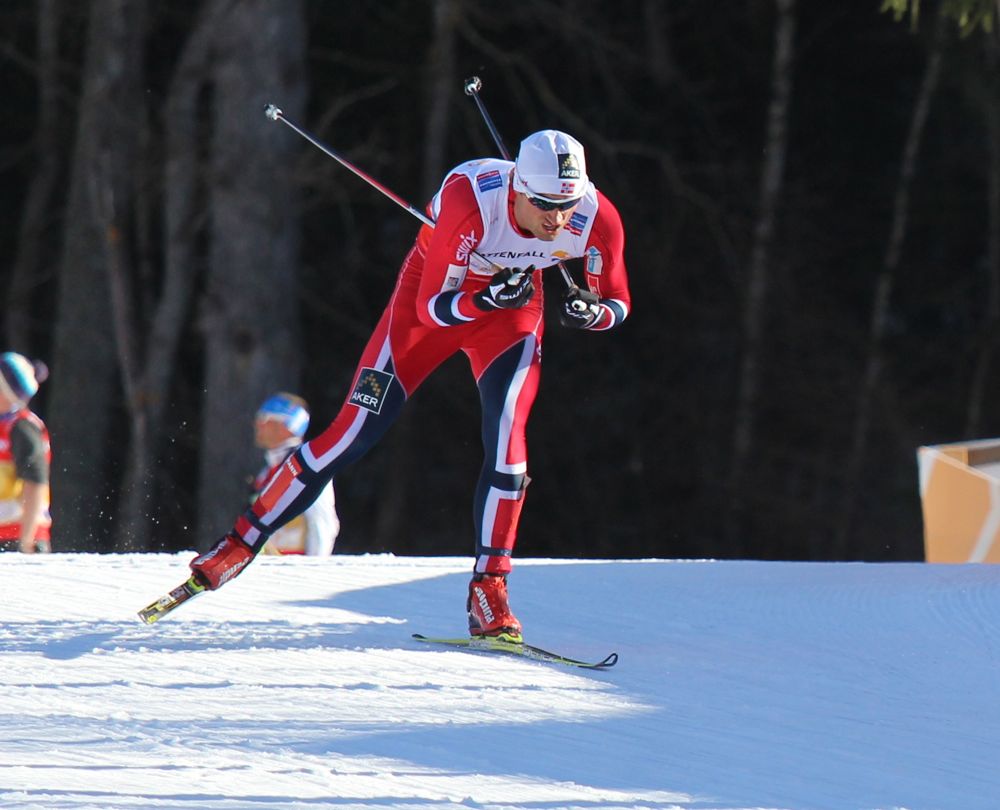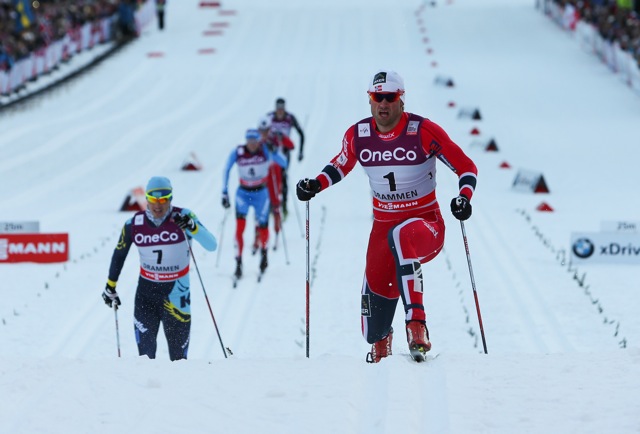
It is accurate, the way time ticks away, to say that it was an eternity ago when Norway’s Petter Northug jr. splashed onto the Word Cup scene to the delight of fans and the paparazzi.
According to the International Ski Federation (FIS) data base, Northug stepped to the top of the podium in only his eighth World Cup start. In the 2005/06 season, he placed first in Falun, Sweden’s 2 x 10-kilometer pursuit. There would be 37 more World Cup wins. Counting the total number of podiums and relying on raw numbers alone might understate the force of Northug’s impact on the sport.
To be sure, the numbers place Northug’s name in the conversation about all-time greats. He won four Olympic medals, two of them gold. Added to the medal vault are an outrageous 16 World Championship medals. Incredibly, 13 are gold.
Northug won the World Cup overall in 2010 and 2013. The Tour de Ski in 2015 fell to him after Martin Johnsrud Sundby was subsequently stripped of his title.
At thirty-two-years old, Northug announced his retirement at a press conference in Trondheim, Norway on December 12. Petter the King is no longer.
Although Northug has been in decline, it’s been a slower fade then perhaps we think. Here’s a quick refresher: just two seasons ago, in 2016, Northug had 10 World Cup podiums. The year before that, in 2015, he notched seven podiums including three wins. Not quite his string of podiums from 2010 to 2013 when he had 16, 12, 11, and 13 World Cup podiums respectively, but stout nonetheless.
A single Northug-type-season could be career defining for an athlete outside the pressure cooker of cross-country expectations that is Norway.
Let’s take a moment for some chills. The first embedded video is of Northug being trademark Northug. It’s a 50-kilometer classic in Falun, Sweden. Berzerk fans. A World Championship stage. And Northug waits. And waits … until the closing moments to make his move. The measure of victory may not seem like total domination – Northug wins a 50 k 2:26.02.1 hour race by meters — but the vibe sure feels like total domination. It also seemed inevitable: Northug lurked, almost forgotten unless you were paying attention, and his progress toward the front and eventual surge seemed almost predictable. No one who saw it could have been surprised. Such was Northug’s presence in the pack during the closing kilometers with big wins on the line. That was Northug.
And there’s this finish in Drammen, Norway from March 2017. Home crowd. The captive theater of a contained urban stage. Northug performs as if an Academy Award was on the line. Down the stretch, Northug kills. He wins his quarterfinal in dramatic fashion. He doesn’t simply slide across the line letting his closing double pole speed speak for itself. He slots in front of an incoming field that charges head-on. Despite his virtuoso quarterfinal, Northug placed 8th on the day. But what I recall from that day on the ground in Drammen was Northug. The posturing stuck with me. Without the posturing, he’d be a different kind of champion. Not better or worse, but not Northug.
That was Northug. A bit of Icarus flying too close to the sun, and just enough raw classy skiing to ingratiate himself to those who love the sport for its woolen-woodsy roots and humble personalities. And the moments he would almost dramatically gear down to V1 when most of his competitors maintained a V2. It was almost as though he was telling them the pace was such he didn’t particularly need to use a big gear. Northug communicated whatever he wanted with his skiing.

Northug’s gravitational pull was immense. His rockstar sensibilities made him a RedBull athlete. A sponsorship deal often reserved for big-line skiers propped atop Alaskan spines with a heli, not cross-country skiers.
In May of 2014, the lifestyle caught up with Northug. He was speeding in his vehicle while under the influence of alcohol when he crashed. Northug’s passenger was injured. Northug also fled the scene and initially stated the passenger was driving at the time of the crash. Northug was ultimately charged for a DUI and found guilty of all charges brought against him. (Norway is a culture that takes DUIs and drinking seriously.)
Throughout the middle of Northug’s career his discontent with the Norwegian National Team made headlines: bad boy and buttoned up ski federation cannot make nice.
As Northug matured, and presumably began to understand his historic place in the sport and in Norwegian ski culture, he made amends with Norway’s hierarchy of skiing.
Northug’s slow fade has been like a dimming star: we know it’s still there, it shines bright, but it’s simply not what it was. As of this season, Northug was, in fact, included on the roster of the Norwegian sprint team. He did not appear in any World Cups this season.
At his press conference Wednesday, Northug was moved to tears as he reflected on his decision to retire, his career, and the importance of his two younger brothers — Evan Northug (23) and Tomas Northug (28).
Norway has new heroes on the ski tracks. Some with flare. Some simply a big set of lungs. None of them Northug.
Jason Albert
Jason lives in Bend, Ore., and can often be seen chasing his two boys around town. He’s a self-proclaimed audio geek. That all started back in the early 1990s when he convinced a naive public radio editor he should report a story from Alaska’s, Ruth Gorge. Now, Jason’s common companion is his field-recording gear.



